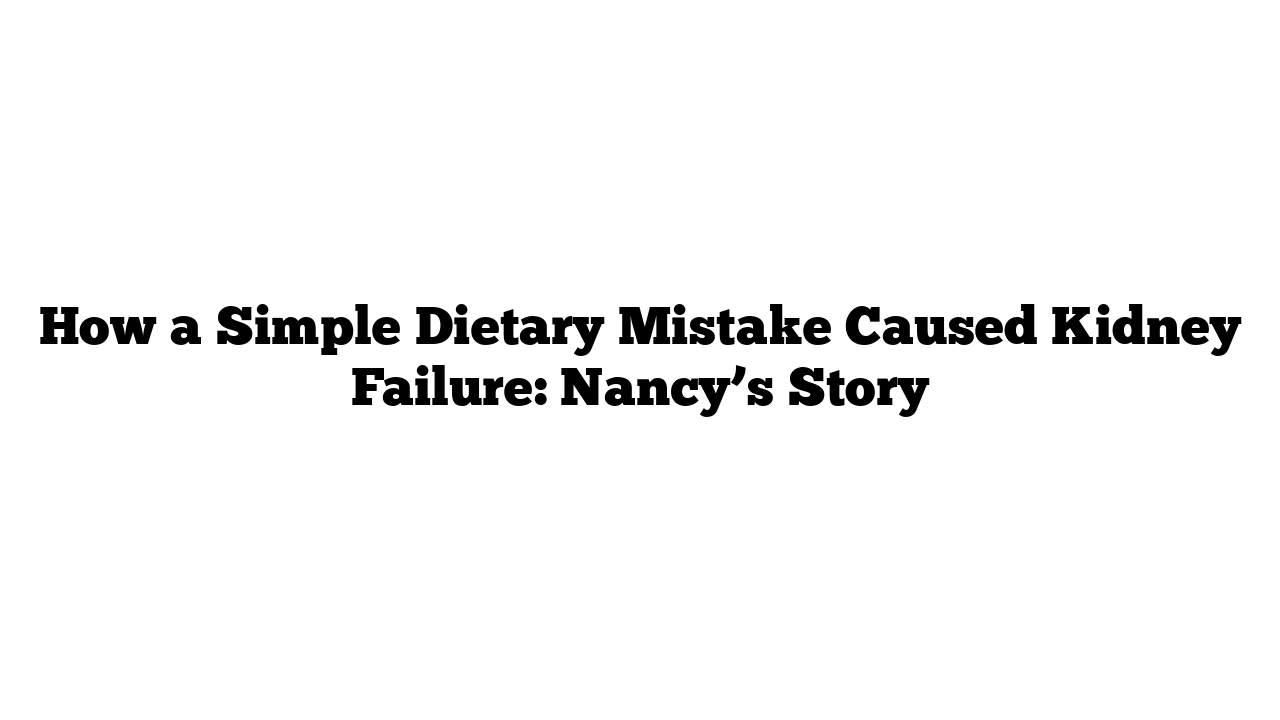A Simple Mistake Leads to Kidney Failure
Nancy, a 63-year-old woman, made a decision to improve her diet. After years of snacking on chips in the evening, she switched to a “healthier” alternative: cashews. However, little did she know that this simple dietary change would lead to kidney failure and drastically impact the rest of her life. This story highlights how a seemingly harmless choice can have devastating consequences for your health.
The Unexpected Problem: Feeling Exhausted
Weeks after changing her diet, Nancy began feeling increasingly tired. Despite consuming multiple cups of coffee, she couldn’t shake off the exhaustion. Worried about her health, she visited her doctor, who ordered blood tests. When Nancy received her results, she was shocked to see that her kidney function was abnormal.
Her kidney filtration rate was only 25% of what it should be. At this point, her kidneys were in serious danger of shutting down, and the question on everyone’s mind was: What caused this kidney damage, and could it be reversed?
The Hunt for the Cause: Kidney Damage Investigation
When doctors investigate kidney disease, they consider three primary factors:
- Is there enough blood reaching the kidneys? – Dehydration or heart/liver problems could be the cause.
- Is there an issue with the kidney itself? – Conditions like high blood pressure or cancer could be at fault.
- Is there a blockage in the urinary system? – Conditions like prostate issues in men are common, but this wasn’t Nancy’s case.
Nancy’s kidney specialist ruled out dehydration, heart or liver disease, and any urinary blockages. But despite extensive testing, no obvious causes were found. Surprisingly, Nancy’s urine sample showed no signs of kidney inflammation, such as protein or blood. Her urine appeared normal.
The Kidney Biopsy: The Key Discovery
As Nancy’s kidney function worsened, a biopsy was performed to examine a tiny piece of her kidney. Under polarized light, something strange appeared: calcium oxalate crystals. These crystals were damaging Nancy’s kidneys, and the condition was diagnosed as nephrocalcinosis.
Nephrocalcinosis occurs when calcium oxalate crystals build up inside the kidneys, causing damage. Unlike kidney stones, which form in the urine, these crystals form directly inside the kidney, resulting in kidney damage.
The Role of Oxalates in Nancy’s Diet
Nancy’s diet was key to understanding why she developed nephrocalcinosis. She consumed about 1 kilogram of cashews per week, which is quite a large amount. Cashews are rich in oxalates, naturally occurring compounds found in many foods, including nuts, fruits, vegetables, and grains.
Normally, calcium binds to oxalates in the body, preventing them from being absorbed and allowing them to pass through the system. But Nancy’s diet lacked enough calcium, leading to excessive oxalate absorption. This combination of high oxalates and low calcium was wreaking havoc on her kidneys.
How Nancy Made Changes to Improve Her Health
Once Nancy’s dietitian identified the issue, changes were made. Nancy stopped eating cashews and began tracking her oxalate intake. Surprisingly, almonds—another popular nut—have even more oxalates than cashews, so she avoided them as well.
To help her body deal with oxalates, Nancy increased her water intake to stay hydrated and added a calcium supplement to her meals. This calcium would bind to the oxalates and prevent them from causing harm.
The Results: Improvement and Long-Term Effects
Just two months after making these changes, Nancy’s oxalate levels normalized, and her kidney function improved significantly. However, the damage was already done, and Nancy was left with mild chronic kidney disease. While her kidneys would never return to full function, the damage was managed, and her condition stabilized.
Lessons Learned: Moderation is Key
Nancy’s case teaches an important lesson: everything in moderation. Even healthy snacks, like cashews, can have negative consequences when consumed in excess.
It’s important to ensure your diet contains enough calcium, as it helps prevent oxalates from causing harm. Water is also essential for kidney health, as dehydration can lead to kidney damage.
Final Thoughts: Focus on Balance
If you want to improve your diet, it’s crucial to focus on balance. While nuts, fruits, vegetables, and grains are healthy, limiting oxalate-rich foods is only necessary if you have specific medical conditions like Nancy. Instead, aim for a well-rounded diet with plenty of calcium and water to protect your kidneys.
FAQs:
- What are oxalates and why are they harmful?
- Oxalates are compounds found in various foods. When consumed in excess and without enough calcium, they can form harmful crystals that damage the kidneys.
- How can I prevent kidney damage from oxalates?
- Focus on a balanced diet with adequate calcium and drink plenty of water. Limit high-oxalate foods only if medically advised.
- Is it okay to eat cashews in moderation?
- Yes, cashews are fine in moderation. Just be mindful of your overall oxalate intake and calcium levels.
- What are the early signs of kidney problems?
- Symptoms like extreme fatigue, swelling, and changes in urination can indicate kidney issues. Seek medical advice if these occur.
